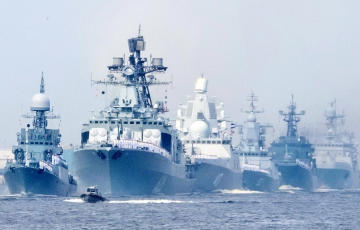Russian Fleet In The Mediterranean Sea "sinks" Without A Fight
1- 16.05.2025, 10:56
- 10,820

The Russian Federation no longer has a key element of deterrence.
Russia's Mediterranean fleet is in decline. The main problems have been old ships, international isolation and the war in Ukraine, writes defense news columnist 19FortyFive intelligence analyst Isaac Zeitz.
Russia has long sought a warm-water port in the Mediterranean. The base in Tartus, Syria, was given to Moscow by the Assad regime. It was Russia's only permanent overseas naval grouping.
Since 2013, Russia has resumed a permanent presence in the region, countering the U.S. fleet.
The fleet is based mostly in Tartus, but is losing combat capability. The warships are mostly from the Soviet era. In 2025, a fire incident on the ship "Kildin" was confirmed.
There are no more submarines in the area of responsibility - a key element of deterrence.
Causes of decline:
1. aging ships and repair problems;
2. war in Ukraine: resources are reoriented to the land campaign;
3. geopolitical isolation: Turkey has closed the Bosporus, cutting off the Mediterranean Sea from the Black Sea Fleet;
4. Limited access to ports and NATO hostility.
In addition, the Russian navy has faced harsh geopolitical repercussions, in particular a reduction of Russian influence in Syria, Libya, and the Middle East.
All of this has undermined Russia's ability to influence maritime routes in the region.
Analysts predict that Russia will probably not give up its Mediterranean ambitions. Provided the war in Ukraine is de-escalated, ship construction and fleet modernization may be resumed.
The Kremlin may more actively engage private military companies (e.g., Wagner) to maintain influence. New alliances with Iran, China or Algeria as a source of port and logistical support are possible.
At the same time, Zeitz notes that without strategic reorientation and resource support, the Russian presence in the Mediterranean will continue to shrink, opening new opportunities for NATO and reducing Moscow's influence in the Middle East.











